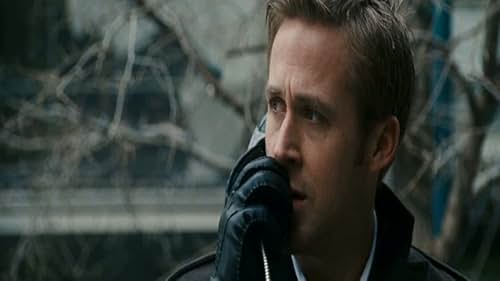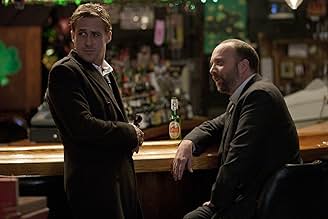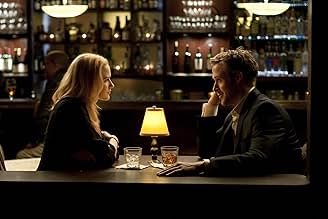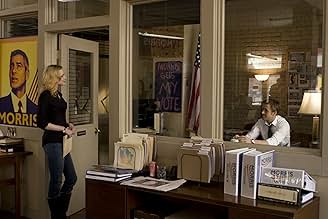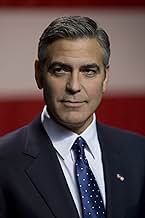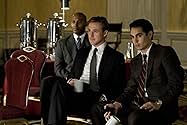An idealistic staffer for a new presidential candidate gets a crash course on dirty politics during his stint on the campaign trail.An idealistic staffer for a new presidential candidate gets a crash course on dirty politics during his stint on the campaign trail.An idealistic staffer for a new presidential candidate gets a crash course on dirty politics during his stint on the campaign trail.
- Nominated for 1 Oscar
- 9 wins & 36 nominations total
Storyline
Did you know
- TriviaStephen Meyers (Ryan Gosling) says about a slur on his opponent, "I don't care if it's true. I just want to hear him denying it." This is a reference to a statement attributed to Lyndon B. Johnson, who allegedly referred to an opponent as having carnal knowledge of farm animals. When an aide said he couldn't say that because it wasn't true, Johnson replied, "I know but I just want to hear him deny it."
- GoofsStephen asks for campaign petty cash to pay for the abortion, and then adds some of his personal funds and gives the money to Molly. It makes no sense for someone as savvy as Stephen to use campaign petty cash in this situation. He would have been making six figures and could certainly afford to use only his money. He wouldn't use campaign funds and risk leaving a trail.
- Quotes
Stephen Meyers: If you want to be president, you can start a war, you can lie, you can cheat, you can bankrupt the country, but you can't fuck the interns. They'll get you for that.
- Alternate versionsDespite the fact that much of the movie was filmed in Ohio, the credits of the theatrical release only say "Filmed on location in Michigan". This was corrected for the home video releases, which read "Filmed in the state of Michigan and the state of Ohio".
- ConnectionsFeatured in Breakfast: Episode dated 1 September 2011 (2011)
- SoundtracksWe'll Meet Again
Written by Ross Parker and Hugh Charles (as Charles Hughes)
Featured review
The Ides of March isn't a story just about the back-alley dealings of those seeking to gain power; it's a morality tale of how much one must wrestle between doing things because he feels they are the right thing to do and doing things that will serve themselves better in the long run. It is a political melodrama, but it just as easily have been written about business and high finance. It's highly cynical, with its points driven home by a terrific cast, and yet it manages not to be heavy handed or preachy. Indeed, there aren't really any strictly good or bad guys in this movie.
Ryan Gosling stars as Steven Myers, a top aide to Governor Mike Morris (George Clooney), who is running for president; currently at stake is the battleground state of Ohio. If Morris can gain Ohio's delegates, he's pretty much assured to get the Democratic nomination, and in the film it's noted that the Republicans have a weak field themselves (at best). All of this means, of course, that as Ohio goes, so goes the presidency, so there's plenty riding on this one primary.
Morris' campaign manager is Paul Zara, played by Philip Seymour Hoffman, a veteran of many cutthroat campaigns. And although Zara has the experience, Morris often turns to his young(ish) aide Steven to gain a less-jaded, more-truthful perspective. (Of course, by doing so, Morris is simply trying to hear from someone who may not be thinking four years or fewer down the road at his next job.) Like most staffers, Steven believes in Morris; he thinks that if the man is elected president, good things will happen. He is the prototypical idealistic aide; doing the right thing will win out over all, he believes. He's not completely naive to backdoor politics, but his organization, his analysis, his acumen, and his spirit are what endear Morris to him.
Even though Steven is not a Mr. Perfect, a self-righteous do-gooder, he's savvy; he knows which buttons to push. He learns, though, that his chief obstacle to success is in recognizing whom is trustworthy, and just because one is friends with another doesn't mean that either owes the other much when it comes to the game of politics. For example, simply feeding the press (in the person of Marisa Tomei) the occasional tidbit doesn't mean that the media will be an extended PR arm for Morris.
Somewhere along the line, Steven reaches a breaking point, a place at which loyalty isn't the most important thing on his plate. This point comes as a result of two pretty bad decisions, one that he knows is a bad idea right away and another that seems a little more innocent – but then Steven has underestimated how petty, parochial, and vindictive those in the business can be. It's all about one's level of paranoia. You have to have some in order to foresee problems, but too much of it will hollow out your soul in a jiffy.
Clooney, who also directed, looks and sounds presidential, but he's not the focus of the movie; as with his brilliant Good Night, and Good Luck, he's a powerful supporting character. Things don't revolve around Mike Morris as they do around Steven Myers, and that's one reason the movie works – our focus is on the morality battle, and it's presumed that as a sitting governor, that battle's long been over for Morris.
The hand-picked cast is superb. Not only do we get Clooney, Hoffman, Tomei, and Gosling, we also get Paul Giamatti as the governor's opponent's campaign manager. Each one seems to steal scenes, even ones they share. Even Evan Rachel Wood, as a new intern in Morris' camp, turns in a splendid performance.
It's clear that The Ides of March won't be for everyone. It is, as I said, cynical – highly so. It won't leave you hopeful about, well, anything. It gives you no one for whom to really cheer and yet no one for whom to really despise. It offers realism in lieu of hope, and its goal of trying to explain the motivations of those who get involved in these campaigns is reached. It's an effective, gripping melodrama.
Ryan Gosling stars as Steven Myers, a top aide to Governor Mike Morris (George Clooney), who is running for president; currently at stake is the battleground state of Ohio. If Morris can gain Ohio's delegates, he's pretty much assured to get the Democratic nomination, and in the film it's noted that the Republicans have a weak field themselves (at best). All of this means, of course, that as Ohio goes, so goes the presidency, so there's plenty riding on this one primary.
Morris' campaign manager is Paul Zara, played by Philip Seymour Hoffman, a veteran of many cutthroat campaigns. And although Zara has the experience, Morris often turns to his young(ish) aide Steven to gain a less-jaded, more-truthful perspective. (Of course, by doing so, Morris is simply trying to hear from someone who may not be thinking four years or fewer down the road at his next job.) Like most staffers, Steven believes in Morris; he thinks that if the man is elected president, good things will happen. He is the prototypical idealistic aide; doing the right thing will win out over all, he believes. He's not completely naive to backdoor politics, but his organization, his analysis, his acumen, and his spirit are what endear Morris to him.
Even though Steven is not a Mr. Perfect, a self-righteous do-gooder, he's savvy; he knows which buttons to push. He learns, though, that his chief obstacle to success is in recognizing whom is trustworthy, and just because one is friends with another doesn't mean that either owes the other much when it comes to the game of politics. For example, simply feeding the press (in the person of Marisa Tomei) the occasional tidbit doesn't mean that the media will be an extended PR arm for Morris.
Somewhere along the line, Steven reaches a breaking point, a place at which loyalty isn't the most important thing on his plate. This point comes as a result of two pretty bad decisions, one that he knows is a bad idea right away and another that seems a little more innocent – but then Steven has underestimated how petty, parochial, and vindictive those in the business can be. It's all about one's level of paranoia. You have to have some in order to foresee problems, but too much of it will hollow out your soul in a jiffy.
Clooney, who also directed, looks and sounds presidential, but he's not the focus of the movie; as with his brilliant Good Night, and Good Luck, he's a powerful supporting character. Things don't revolve around Mike Morris as they do around Steven Myers, and that's one reason the movie works – our focus is on the morality battle, and it's presumed that as a sitting governor, that battle's long been over for Morris.
The hand-picked cast is superb. Not only do we get Clooney, Hoffman, Tomei, and Gosling, we also get Paul Giamatti as the governor's opponent's campaign manager. Each one seems to steal scenes, even ones they share. Even Evan Rachel Wood, as a new intern in Morris' camp, turns in a splendid performance.
It's clear that The Ides of March won't be for everyone. It is, as I said, cynical – highly so. It won't leave you hopeful about, well, anything. It gives you no one for whom to really cheer and yet no one for whom to really despise. It offers realism in lieu of hope, and its goal of trying to explain the motivations of those who get involved in these campaigns is reached. It's an effective, gripping melodrama.
- dfranzen70
- Oct 7, 2011
- Permalink
Details
Box office
- Budget
- $12,500,000 (estimated)
- Gross US & Canada
- $40,962,534
- Opening weekend US & Canada
- $10,470,143
- Oct 9, 2011
- Gross worldwide
- $76,338,111
- Runtime1 hour 41 minutes
- Color
- Sound mix
- Aspect ratio
- 2.39 : 1
Contribute to this page
Suggest an edit or add missing content




